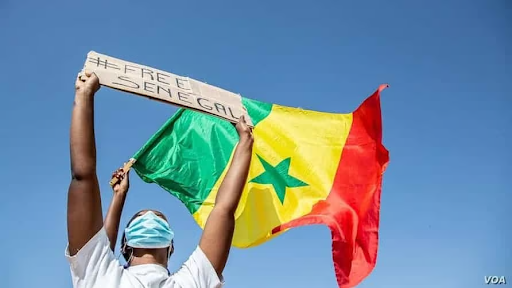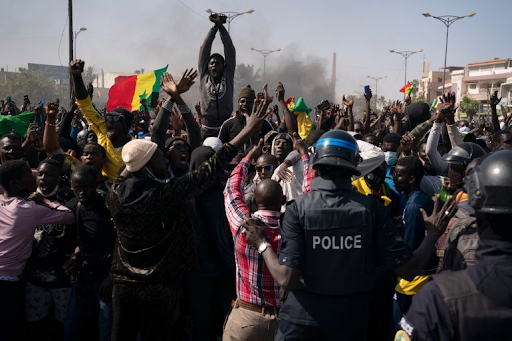A Rape Case Exposes The State Of Women’s Rights In Senegal
A rape accusation made by a young woman against an opposition leader in Senegal has brought a profound, disturbing societal dysfunction in Senegal to the fore. The accusation has become politicised and is in danger of trivialising accusations in future.

In Senegal, a rape case brought by a young woman against a prominent politician has laid bare the state of sexual and gender-based violence in the West African country which is often considered the “beacon of African democracy”.
In 2021, Adji Sarr, a former employee at a massage parlour in Senegal alleged that she was raped repeatedly and silenced with death threats by Ousmane Sonko, a popular opposition leader in the country. This has since sparked protests in the country.
The first protests began on March 3, 2021, when Sonko went to court to respond to the allegations levelled against him. Since then, there have been sporadic protests by his supporters, who say that the rape case is politically motivated and engineered by the incumbent Senegalese President, Macky Sall.
Two years later, the Senegalese court passed a verdict on the case. In its verdict read on June 1, 2023, the court acquitted Sonko of the allegation of death threats and requalified the rape charge against him to a lesser one, “the corruption of youth,” for which it found him guilty.
Sonko was sentenced to a two-year jail term with a fine of 600, 000 CFA and another 20 million CFA which he must pay to Sarr. This sentencing which has now barred Sonko from contesting Senegal’s 2024 elections has led to days of violent riots and protests which have shaken the “stable” republic.
But the protests were not in support of Sarr, they were in favour of the politician whom many believe to be a victim of witch-hunting by the incumbency, and has thus set the stage for further politicization of what was already a greatly politicised rape case.
Activists have said that this focus on politics has relegated the crime of sexual violence to the rear so that instead of questioning the requalification of a rape case as one of ‘corruption of youth’, the reputation of the victim has been questioned and severely vilified.
Beacon of stability, but not for all?
While Ousmane Sonko has been referred to as a “devout Muslim and a good family man”, Adji Starr has come under tougher scrutiny.
Many of Sonko’s supporters heaped dirt on her personality. Her job as a masseuse has also been used against her as it is a career path often likened to prostitution.
Witnesses in the court proceedings have described Sarr as “promiscuous, provocative, frivolous, manipulative,” among other degrading labels.
Due to the massive disbelief and questioning of her character, Sarr publicly declared that she would retract her case against Sonko if he would swear by the Qur’an that he had not done all that she accused him of.
Why is Adji Sarr viciously attacked?

The social standing of the accused makes him a larger-than-life figure; this explains some of the support shown to him. Beyond that, however, a bigger and deeper issue is at play: the trivialisation of sexual violence and how women are generally viewed.
In Senegal, laws do not view the offence of rape as one. It is seen as a simple misdemeanour and was recognised by the law as such up until 2020 when due to the clamouring of feminists and human rights activists in the country, it became a serious offence punishable by a minimum of 10 years and a maximum of life imprisonment, as opposed to the maximum of 10 years formerly accrued it.
But nothing seems to have changed since then as many people in the country still do not know what constitutes rape, reports show.
Some citizens of the country consider rape as merely “casual flirtation gone too far”, not warranting a punishment. Some even say it is a “favour” done to the victim.
“You should be proud that Ousmane Sonko raped you, that makes you a potential future first lady in hiding,” an online comment directed at Sarr, read.
“A man is not defined by the rape that he inflicts on a woman,” “You can still be a rapist and still be good,” other comments read.
Sonko himself has been criticised by some Senegalese and women’s rights organisations for making similar comments.
“Even if I had to rape, I would not rape someone who looks like a monkey that has had a stroke,” Sonko said in a life streamed speech where he repeatedly proclaimed his innocence.
A highly complicated problem
A look at the female representation in Senegal’s government tells a different story from that which is portrayed by its society.
Seventy-three, out of the 165 seats in the country’s parliaments, are occupied by women, making it more than 44 per cent of the population in parliament, a stark difference from its bigger West African neighbour, Nigeria, whose percentage of female lawmakers have never gone past 7 per cent.
As of 2022, Senegal was ranked by Interparliamentary Union as “the fourth in Africa and 18th in the world for gender parity in parliament.”
For context, the country was ranked above the United States, Britain, France, and Switzerland, all of which are “first-world countries.”
This disparity between female representation and the reality of women in Senegal tells a tale of a country where harmful norms are so intricately imbued in the fabric of things that an almost equally balanced parliament has not influenced or altered these norms in any significant ways, it seems.
In 2018, Songue Diouf, a philosophy professor, said during a popular TV show: “You do everything so that we rape you, and when we rape you, we go to prison and you who have done everything so that you are raped, continue to be free.”
Even though this comment was made two years before the criminalisation of rape and the inauguration of Senegal’s “exemplary” parliament, it remains the view of many in the country and has become more pronounced following the Sarr-Sonko rape case.
Organisations who have spoken up in support of Adji Sarr have come under threats of many sorts with pictures and names of some feminists publicised on social media with calls to attack them.
To support Adji Sarr is “to expose oneself to threats,” Senegalese feminists write.
Female minors in Senegal also face similar realities as their adult counterparts. Across the country, young girls are targeted for sexual harassment, exploitation, and other forms of sexual abuse by their teachers.
In many cases, the perpetrators are not apprehended but rather let off after a negotiation between them and the families of the victim. Some girls are not brave enough to disclose their abuse to their families as there is still a purity culture in the country.
In a 2018 report titled “It’s Not Normal,” Human Rights Watch spoke extensively on the sexual abuse of female students in Senegal, calling for swift action by the government.
Culture of silence
At the centre of all this is a huge culture of silence propagated by a practice known as Sutura. “A hybrid of Muslim ethical traditions and pre-Islamic social norms,” Sutura is a practice which places the burden of a modest society on women.
They are looked upon to maintain this modesty and “sanity” by “covering their bodies in modest clothing, or by shielding domestic affairs from public view” so as to maintain a balance in social life.
This complex practice which in some ways protects the victim of sexual violence (and is upheld even by Senegalese feminists) propagates a culture of silence that shields perpetrators of sexual violence and stigmatisation for the victim- a case of the bad outweighing the good.
Feminists want to be heard
Feminists in Senegal have decried the politicisation of Adji Sarr’s alleged rape, pointing out that the villainization of the young woman has set a dangerous precedent which will now pull the country many years back as far as misogyny is concerned.
“Now women will think twice about coming forward,” a street cleaner in Senegal said to Washington Post in March, expressing her fear.
African Feminism, a pan-African women’s rights platform released a statement in reaction to the verdict passed on the case.
In a section of its statement titled “feminist reading of the verdict,” the group said that it has misgivings against the verdict as it “suggests illicit sexual contact between the two but no rape.”
“Femicide is increasing, and violence is proliferating, yet few dare to break the silence or initiate legal proceedings to seek justice,” the statement read, emphasising that the radical politicisation of the matter is dangerously contributing to silencing women.
Decrying the “trivialisation of rape,” by the verdict, the “hunting of feminists,” as well as “self-centred male discourse in which the grievances of Senegalese women remain in the periphery and are not considered.”
African Feminism also made demands of the Senegalese authorities. Some of them include Greater security for women and children, the confidentiality of survivor’s personal data, more rigorous training of the press in media coverage of sexual and gender-based violence, and the establishment of specialised courts to try perpetrators of sexual assault,” among others.
Support Our Journalism
There are millions of ordinary people affected by conflict in Africa whose stories are missing in the mainstream media. HumAngle is determined to tell those challenging and under-reported stories, hoping that the people impacted by these conflicts will find the safety and security they deserve.
To ensure that we continue to provide public service coverage, we have a small favour to ask you. We want you to be part of our journalistic endeavour by contributing a token to us.
Your donation will further promote a robust, free, and independent media.
Donate HereStay Closer To The Stories That Matter




